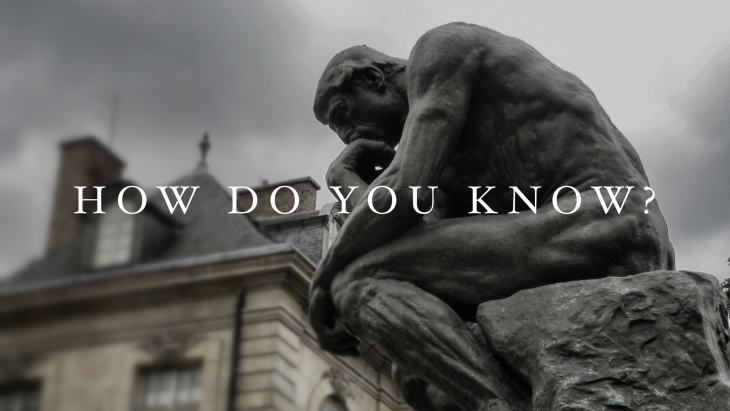I am surrounded by idiots. They are everywhere.
That’s an ugly beginning to a religious column, so let me explain myself. In today’s English, an idiot refers to someone who is stupid and lacks intelligence. However, that’s not the word’s original meaning and not the intent of my (purposefully) shocking opening line.
The word idiotes is Greek in origin, growing from the root idios, or “self” (for instance, an idiosyncrasy is a characteristic that is peculiar to a specific person).
In the 4th century B.C., the Greek philosopher Aristotle popularized the term idiotes and used it to describe the two types of people in the world. On the one hand, there were the zoon politikon, the political beings. They were good citizens of the polis (community) and had the common good in mind. On the other hand, there were the idiotes, the self-absorbed and uninvolved in the goings-on of the community.
As the term grew in usage, it seems idiotes came to refer to the socially irresponsible, whom the Greeks considered apathetic, uneducated, and ignorant. The political connotation of the word faded over the years and idiotes came to mean uneducated, inexperienced, and ignorant – a common person.
This is how the Bible uses the term: “When they saw the courage of Peter and John and realized that they were unschooled, ordinary men (idiotai), they were astonished and they took note that these men had been with Jesus (Acts 4:13).”
As the Latin world began overshadowing the Greek, the word was loaned (idiota) and pigeon-holed to mean an ignorant person, with no political or social implication. Here the word has remained with little change. In English, the word eventually settled as “idiot” and refers to a lack of intelligence. Americans added one exciting alteration: the “idiot box.” I can still hear my mother use that phrase as my brothers and I sat in front of our wooden-console television. I’m not sure if it was directed to us or the T.V.
So when I say, “I’m surrounded by idiots,” I’m not referring to the mental capacity or education of those around me. I mean that I am surrounded by self-absorbed, uninvolved, socially irresponsible people to whom the idios (self) is the most important thing in the world.
I first began to notice this in the gym several years ago. Before, we all knew each other and talked between exercises of our common hatred for exercise, cantankerous Texas weather, whatever. Now everyone has earbuds in place and conversations have all but disappeared.
I noticed it when “selfies” became a thing and folks endangered themselves chasing Pokemon.
I was reminded of it the other day as I drove through town on I-35. While dodging potholes and progress (construction) I was passed by multiple speeding cars whose drivers were looking at phones rather than the road.
I notice it when I choose the self-check-out line at the grocery store though other lanes are unoccupied…or when I go to the coffee shop and everyone in the joint is on a device of some sort…or in restaurants as kids are given their parents’ phones to keep them quiet.
I notice it on social media and in political discourse. We don’t listen anymore.
We’ve become self-absorbed idiots.
The Hebrews, who pre-dated Aristotle’s idiotes, had their own word for this person. In the wisdom literature of the Bible, this person was a “fool.”
The fool lacks wisdom (Prov. 14:33), but rejects the correction and discipline necessary to gain wisdom (Prov. 17:10). Because of his self-absorption, folly becomes eponymous in a fool’s life: “As a dog returns to its vomit, so a fool repeats his foolishness (Prov. 26:11).”
One preoccupied with his own feelings and interests often lacks self-control, is hot-tempered, and is driven by emotions (Prov. 19:11). He thinks he knows it all and refuses to listen to others (Prov. 28:26).
This, of course, isn’t a pretty picture, which makes it all too easy for us to read about the fool and not see ourselves in the description. That’s why the sages remind us that even we, in our pursuit of wisdom, can exhibit foolish vices if we aren’t careful: “Do you see a man who is wise in his own eyes? There is more hope for a fool than for him (Prov. 26:12).”
It’s not easy living among idiots. Sometimes our neighbors are stupid: “Like a madman who throws flaming darts and deadly arrows, so is the man who deceives his neighbor and says, “I was only joking!”(Prov. 26:18-19).” Sometimes they are noisy: “If one blesses his neighbor with a loud voice early in the morning, it will be counted as a curse to him (Prov. 27:14).”
Suffering fools gladly in the polis is challenging. But biblical wisdom isn’t only about pointing out the fools of the world. It offers solutions. The question is how we become good citizens and neighbors in a world full of idiots?
The answer: Embrace godly wisdom to avoid idiocy. Cultivate civility. Step out of self-absorption and navel-gazing and into the world. Choose words judiciously (Prov. 16:23), calm volatile situations rather than inflame them (Prov. 29:8), and know when to remain silent (Prov. 10:19). Be kind (Prov. 12:18), show self-restraint (Prov. 11:12) and do what is right (Prov. 15:21). Take heed of the company you keep (Prov. 13:20) and when necessary, accept counsel (Prov. 12:15) or reproof (Prov. 9:8) from others.
The biblical answer to folly is wisdom. This Hebrew word (hokmah) literally means skill. It is a skill for life…skill in relating to and dealing with family, friends and community…and idiots. Wisdom first begins with setting aside the idios (our egos) and following God’s direction: “The fear of the Lord is the beginning of knowledge, but fools despise wisdom and discipline (Prov. 1:7).” Rescuing the nation from idiocy begins here.
















 RSS - Posts
RSS - Posts